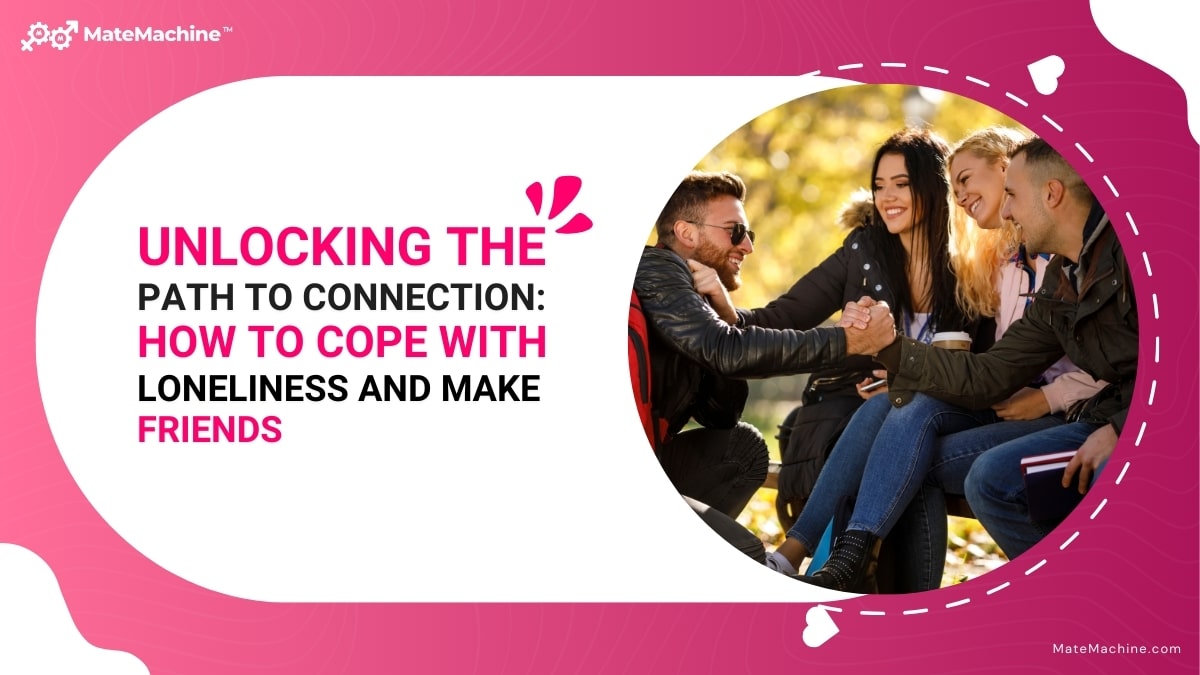Archives

Unlocking the Path to Connection: How to Cope with Loneliness and Make Friends
- Posted on
- 278
- 0 Comment
Meaningful friendships are valuable in life, but there may be times when you lack close friends. If this is your current scenario, you can deal with it by developing self-compassion and growing more at ease with solitude. Keep in mind that anyone has the potential to become a friend! So keep reading since we are going to discuss How to Cope With Having No Friends.

Understand Your Emotions
Social connections are at the root of our emotional and psychological well-being. They make our lives rewarding, give us a sense of belonging, and dramatically impact our happiness. Many of us, though, sometimes feel lonely and isolated in our lives due to changed circumstances, personal challenges, or even the ebb and flow of our social network. The first step toward understanding and overcoming such feelings of loneliness and isolation is recognizing them.
Knowing if You Are Lonely
You may feel lonely emotionally and physically. You may feel out of touch with others, empty, or unable to engage in the activities you used to love. Keep in mind that loneliness is a common human emotion, it is not a question of self-worth.
An important difference exists between aloneness and loneliness. You can be alone and like it. On the other hand, loneliness ensues when you don’t have people in your life, or perhaps when you do, but you feel inadequate in fulfilling your needs with the people you do have in your life. It is not about the number; it is more about the quality and value of these relationships and how supported one feels.
Accepting Your Current Situation
A very key aspect in the achievement of getting rid of loneliness is acceptance of your current emotional state. A good dose of self-acceptance lets you know your feelings without criticizing them, hence giving them room to heal and change. Realize that this stage is just temporary and that people go through such feelings at different stages of their lives. Knowing and acknowledging that this situation can and will change makes you able to go out seeking other avenues of connecting.

Exploring New Avenues for Connection
Feeling isolated or friendless can be difficult; however, there are manifold paths to explore for connection and community. Here are some ideas that can help you build relationships and enlarge your social circle:
Getting Involved in New Activities
New activities are the best way to drive out loneliness. If you are going to find activities that really involve you, most likely, you will meet people who like the same things as you. Painting or hiking, a book club—it could be anything that arouses interest and works as a connecting agent with people who share your enthusiasm.
Another excellent option is joining clubs or other groups that align with your interests. Look for community centers, libraries, or other local institutions that offer classes or workshops in areas that interest you. Often, the sense of comradeship in group activities can help alleviate loneliness.
Volunteering
Volunteering is a special opportunity to meet people and to give back to your community. It works both ways: you feel good by doing something positive in society and bonding with other people. If you take part in volunteer work, you will meet other like-minded people who will share your ideas and interests. This will make you feel that you belong and will give you a sense of purpose. Many organizations need volunteers; therefore, explore opportunities locally or even virtually.

Building Self-Confidence
Building self-confidence when facing a lack of friends is essential. It not only helps you cope with loneliness but also empowers you to take proactive steps toward creating social connections and enriching your life. Here are some of the most important aspects you need to keep in mind:
Improving Self-Esteem
Much of making new connections depends on how confident you are in yourself. Setting small, achievable targets can help you feel better about yourself. Positive self-statements, also called positive affirmations—very simple statements that emphasize your worth—are also useful for shifting your thoughts and feelings about yourself over time. Statements like “I am able and deserving of love” will reorient your thoughts and attitudes about yourself.
Developing Social Skills
Developing better communication skills is a great place to start in becoming more comfortable when it comes to creating new relationships. Try practicing your conversation starters or even role-playing with a friend or family member to help you feel more confident in social situations. As far as small talk goes, it really does have much to do with being interested in other people. Ask open-ended questions and really try to listen to their response—this tends to make for a more interesting conversation.

Seeking Professional Help
Choosing to seek professional help in such situations is a sign of courage towards healing and self-improvement. Seeking help from professionals avails them with the tools necessary to solve life problems effectively.
Talk to a Therapist
If feelings of loneliness are overwhelming, then it will help to see a therapist. Professional therapeutic support will help provide the person with individual ways of dealing with overcoming loneliness and learning to relate healthily toward others. They shall be able to help you identify some of the potential root causes which might be leading to these feelings of isolation and give you a safe space to talk about yourself.
Joining Support Groups
There are support groups available for friendship and a feeling of empathy with others like you in the same struggles. They may be locally based or online where you will share your views on experiences and how to cope with them. Mutual support will alleviate the feeling of isolation and allow you to feel understood.
Connecting Through Technology
The distance gets bridged by technology, and it creates the possibility of meaningful engagement to a person regardless of their geographical location in a physical sense. Further in this article, we are going to talk about communication methods that have been proven useful.
Online Communities
In today’s digital society, online communities create space for relationships and friendships. Through the search of a forum or social media group that may interest you, like-minded people can be found. However, make sure to do it safely by keeping your privacy safe and taking steps to get through your own judgment in building those online friendships before meeting them up in person.
Apps for Making Friends
Many apps focus on the development of friendships, like Bumble BFF or Meetup. These tools are really good for finding people who are either just looking for friends or for doing activities together. Of course, though, one should be cautious when trying to develop friendships via online means. Always ensure that you meet the other person in a public space until you start feeling more confident about your developing new friends.

Building a Full Life Alone
One can live a full life alone, and it can indeed be very enriching. Yes, it has its difficulties, but one learns quite a lot of ways to fashion a rewarding life with personal growth, connection, and joy right at the core.
Learning to Enjoy Solitude
It is believed that solitude is very important for many reasons and, thus; it is essential. Feelings of loneliness will reduce as one learns to have fun with their company, thus letting them carry out other activities like reading, meditating, or just doing things on their own. It is not isolation; rather, self-discovery and finding joy within.
Goal Setting
Focusing on personal goals not only increases self-growth but is also the path to fulfillment. Challenging yourself to learn new skills or work toward a certain goal creates feelings of accomplishment in you. Whether working out, academic pursuits, or creative projects, movement toward something gives a person direction and meaning.
Conclusion
Overcoming loneliness needs the fostering of self-love and resilience. Lastly, do understand that though the road may be rough, there are indeed many ways of cutting out that lonely feeling. Keep a warm heart and mind towards new friendships and acquaintances; sometimes they are at your doorstep, or maybe they are waiting on your initiative. Remember, building meaningful connections sometimes starts with the love you cultivate within yourself. Take one day at a time, and allow yourself to begin seeing the possibilities.
FAQs
1.Is it normal if I don’t have friends?
It’s completely normal to feel like you don’t have friends at times; many people go through phases of solitude. What’s important is finding connections that resonate with you, whether through hobbies, interests, or new experiences.
2.Would I be happier without friends?
Yes, it is completely possible. Social connections do make life much more satisfying, but it doesn’t take friendships to lead a happy life.
3.How does having no friends affect your mental health?
Some researches show loneliness can cause an increase in stress. It’s also associated with an increased risk of certain mental health problems such as depression, anxiety, low self-esteem, and sleep problems.

